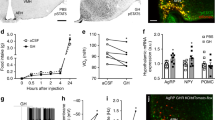Abstract.
The Agouti-Related Protein (AgRP) is a powerful orexigenic peptide that increases food intake when ubiquitously overexpressed or when administered centrally. AgRP-deficiency, on the other hand, leads to increased metabolic rate and a longer lifespan when mice consume a high fat diet. In humans, AgRP polymorphisms have been consistently associated with resistance to fatness in Blacks and Whites and resistance to the development of type-2 diabetes in African Blacks. Systemically administered AgRP accumulates in the liver, the adrenal gland and fat tissue while recent findings suggest that AgRP may also have inverse agonist effects, both centrally and peripherally. AgRP could thus modulate energy balance via different actions. Its absence or reduced functionality may offer a benefit both in terms of bringing about negative energy balance in obesigenic environments, as well as leading to an increased lifespan.
Similar content being viewed by others
Author information
Authors and Affiliations
Corresponding author
Additional information
Received 29 February 2008; received after revision 7 April 2008; accepted 22 April 2008
Rights and permissions
About this article
Cite this article
Ilnytska, O., Argyropoulos, G. The Role of the Agouti-Related Protein in Energy Balance Regulation. Cell. Mol. Life Sci. 65, 2721 (2008). https://doi.org/10.1007/s00018-008-8104-4
Published:
DOI: https://doi.org/10.1007/s00018-008-8104-4




